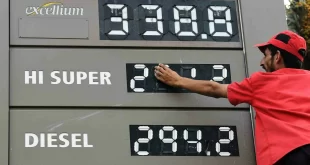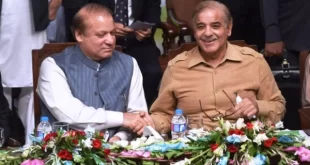Miftah announces new revenue measures totaling more than Rs50 billion; new taxes for the tobacco and retail industries; and subsidies free from the GST
ISLAMABAD In order to satisfy the International Monetary Fund (IMF) before it approves Pakistan’s bailout package later this month, the government lifted the ban on all non-essential, or luxury, imports and announced new revenue measures totaling more than Rs50 billion in the first mini-budget of this fiscal year.
Finance Minister Miftah Ismail announced on Thursday at a news conference in the federal capital that higher taxes totaling Rs36 billion had been placed on tobacco and cigarettes, and that adjustments to the tax system for retailers will result in additional taxes of roughly Rs14 billion.
According to him, a few additional planned tax breaks for banks, real estate, capital markets, and other entities have been put on hold for the time being.
According to the minister, Pakistan has fulfilled all prerequisites and previous measures mandated by the IMF for the $1.18 billion disbursement under the 7th and 8th reviews. It has also complied with an extra funding arrangement of $4 billion from Qatar, Saudi Arabia, and the United Arab Emirates, as well as the re-rolling of payable debt by China.
The minister clarified that the import embargo was put in place on May 19 for a two-month period in order to prevent the outflow of limited foreign cash. “However, the Fund wanted clarity on certain issues,” the minister stated. But he said that the World Trade Organization (WTO), with whom the IMF collaborated closely, may have brought up the problem of the import ban, which is why the Fund wanted the prohibition lifted.
According to Mr. Ismail, the prime minister made arrangements for the purchase of one million tonnes of wheat, 200,000 tonnes of urea, cotton, edible oil, and pulses, which helped keep prices under control, because the government’s first priority was to provide for food supplies. He was not in the mood to allow luxury imports to come in.
Pakistan’s decision to feed its 230 million people rather than import luxury goods like Mercedes, iPhones, and home appliances was therefore simple given its limited financial resources.
The government would impose three times the current regulatory duties—the maximum allowed by WTO rules—on completely built units (CBUs), or finished goods. “But since this is a demand of the international community, we are lifting the ban on imports and replacing it with prohibitive regulatory duties of 400pc to 600pc so that fewer dollars be spent on luxury imports,” he said.
“I shall prioritize flour, wheat, cotton, and edible oil over iPhones and vehicles with my limited resources. In order to prevent their import, we will lift the bans but apply exorbitant taxes in the form of sales tax, regulatory duties, and customs duties,” he stated.
He claimed that in order to limit imports while adhering to IMF requirements and other international accords, the import embargo was eased.
The minister acknowledged that restaurants in Karachi and Islamabad continued to serve sushi and salmon in spite of the ban. Since these consignments could not have been four months old, the minister surmised that they were still being received, possibly through the green channel that the government would soon regularize with duties. According to the minister, the goal of these levies is to discourage the outflow of foreign currency rather than increase revenue.
In response to a query, he stated that while industrialists would not face any limitations when importing machinery to produce goods for export or small amounts of spare parts, they would still have limitations when importing machinery to produce goods for the domestic market.
In response to a query concerning imports by companies that produce or assemble cars, smartphones, and household appliances, Mr. Ismail stated that the State Bank of Pakistan, the Ministries of Industries and Commerce, and the Commerce Ministry would initially permit them to import half as much as they had previously.
Before things resumed as usual, he begged, “Let me get my head above the water,” adding that “we would have to remain within our means and allow imports that could be covered with remittances and exports and no more.”
In addition, he added, the government has complied with changes to power tariffs, would guarantee that all subsidies are covered by the budget, and would continue to work toward creating a primary fiscal surplus of Rs. 153 billion (the difference between receipts and expenditures, excluding debt servicing).
In reference to the tax measures, Mr. Ismail stated that he had erred in his projection of Rs42 billion in revenue from a tax on retailers, since it also applied to very small traders who used up to 50 units of electricity and had monthly bills between Rs. 1,000 and Rs. 2,000. Additionally, the Federal Board of Revenue inadvertently charged Rs. 6,000 per month in tax instead of Rs. 3,000.
He claimed that as a result, this had to be withdrawn right away, on July 1. We might now recover Rs27 billion as opposed to Rs42 billion, a difference of Rs15 billion.
According to the finance minister, the government will now issue an ordinance over the course of the next few days imposing variable taxes on traders. The initial taxes will be a 5% sales tax and a 7.5 percent income tax, which would apply to all traders for a period of three months, or until September 30.
beyond three months, starting on October 1, there will be a 5 percent sales tax and a 7.5 percent income tax on consumption up to 50 units. After that, the taxes will progressively rise to 7.5 percent, 10 percent, and 12.5 percent for increasing consumption, and beyond 1,000 units, to 12.5 percent and 20 percent sales tax and income tax, respectively.
The minister stated that the additional Rs36 billion in tax on the tobacco business more than made up for this Rs15 billion shortfall. The present tax on tier-2 packs, which is Rs1,850 per 1,000 cigarettes, will increase to Rs2,050, and the duty on tier-1 packs, which is Rs5,900 per 1,000 cigarettes, would increase to Rs6,500. Additionally, the tobacco cessation tax is being raised from Rs10 per kg to Rs380 per kg.
According to Mr. Ismail, the government has eliminated sales tax on power subsidies paid for out of budget. Previously, the FBR levied this tax on the final cost of electricity, which was approximately Rs. 22–24 per unit, while the government was only charging Rs. 9 per unit to export sectors. He claimed that taxing subsidies and paying for them out of pocket made no sense.
The actual cost of the units that are billed to a customer will now be subject to sales tax charges by the FBR; the forthcoming ordinance will address this as well. Gas prices will now be determined by the same principle.
The minister promised to resolve the problem of sales tax on agricultural products and machines.
 Pakish News We are an interactive media group that here a purpose to update users with the latest information. Our mission is to give you knowledge not only about your surroundings. We will also update you around the Globe.
Pakish News We are an interactive media group that here a purpose to update users with the latest information. Our mission is to give you knowledge not only about your surroundings. We will also update you around the Globe.



